Launching new music at The Great Escape
- Published
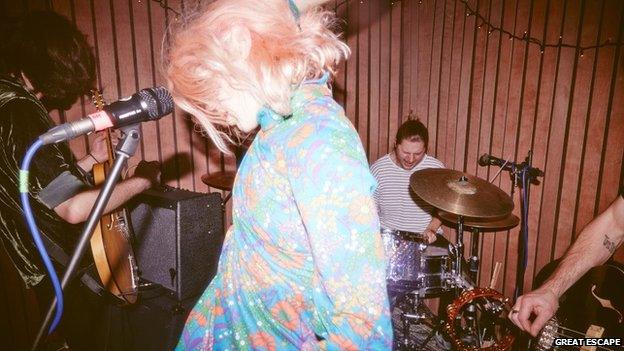
Homegrown Brighton band Black Honey have made an impression at this year's Great Escape festival.
Over the past decade there's been a noticeable shift as more music lovers swap their wellies for pavement-friendly footwear - as festivals flourish not just in the fields, but in the inner-city.
Events which began primarily as industry showcases (such as Manchester's In The City and CMJ in New York) have inspired urban festivals that provide a forum for up-and-coming artists to play, not just for record labels, but also to audiences with an increasing passion for new, often unsigned, acts.
While the US market looks to South By South West in Austin, Texas as a window for breaking artists, for the UK has The Great Escape.
Billing itself as 'Europe's leading festival for new music', the annual event took place in Brighton this weekend, celebrating its 10th anniversary.
But what role does the event play in helping music careers and, ten years in, can it maintain its independent ethos?
Over 450 bands from 40 different countries played at around 30 venues dotted around the city, open to the public and over 3500 delegates from different territories around the world.
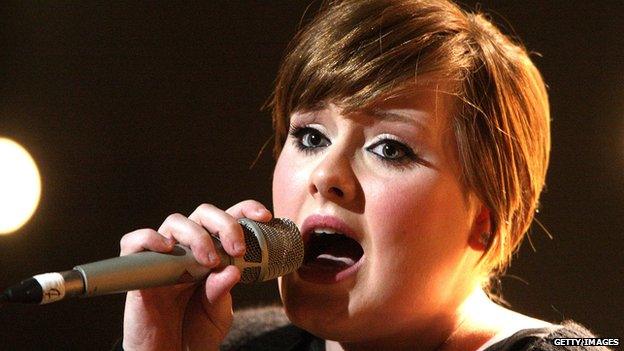
As a newcomer to the music scene, Adele performed at The Great Escape in 2007.
Over the past decade Festival Director Kat Morris believes the festival has been a vital in giving artists exposure at the start of their careers.
"We had Adele playing in a café to 80 people in 2007," she says. "The Maccabees played in 2006, we had Royal Blood last year.
"Mumford & Sons, Foals, Haim and pretty much anyone you can think of has played!"
From industry perspective, managers, booking agents, promoters and record company staff are all in attendance, looking for the next big thing. As Morris explains "Everyone here has got the most incredible appetite for new music.
"People want to see new music from the moment they wake up till the moment that go to sleep. "
Soak (aka Bridie Monds-Watson) is a 19-year-old singer-songwriter from Derry, who's gained attention via BBC Introducing. "It's really important," she explains, "It's the place where everyone collectively gathers, and a lot or people go to search for new music.
"I know I met a lot of my team the first time I played here and was introduced to them. So it was very important to me."
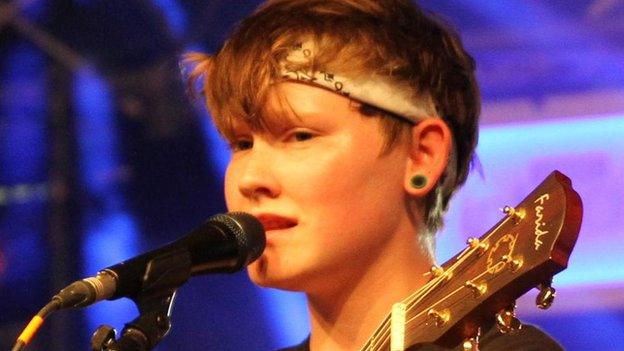
Soak performed on the BBC Introducing stage at Glastonbury last year.
For many bands from outside the UK, this is the first step on the ladder to success in Europe.
Nineteen-year old New York singer-songwriter Tor Miller is on the bill. He recently signed to Glassnote Records (the label behind acts like Mumford & Sons, Phoenix and the Temper Trap). He believes the event holds special kudos for US artists.
"It's massively important," he explains. "I know lots of bands who've made their claim here, then took it back to the States.
"I always thought it was a bit of a cool story, being a kid from New York coming to the UK. Then things started to move quicker here, so that seemed 'cooler' to my friends back home - so it made them interested in what I was doing."
"There's more of an openness [in the UK]," says Miller, adding that it "doesn't seem as provincial".
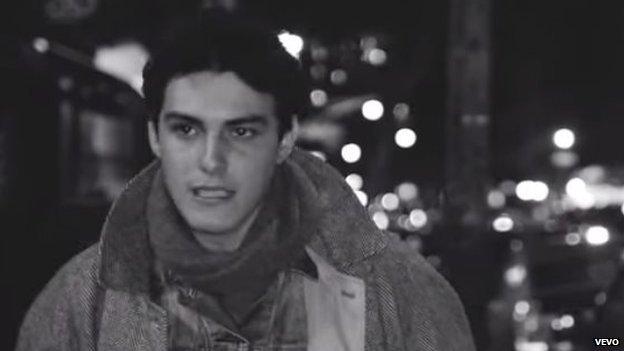
Tor Miller played at the Great Escape festival on Friday
"I think that you can hear more sorts of music, whereas in the States where everyone is saying, 'This band will be the band of 2015'".
The ease with which bands can record themselves and distribute their music does mean that more and more acts are vying for fan's attention. As a result the pressure is on to make an impact as soon as possible.
If you're not picking up fans after releasing a couple of tracks, then the audiences and record companies may well move on to the next new artist.
Matt Mason, from Britpop-influenced Sydney trio DMA's, played their first UK show at The Great Escape and are about to release their debut EP. They think this high turnover of acts is a uniquely British thing.
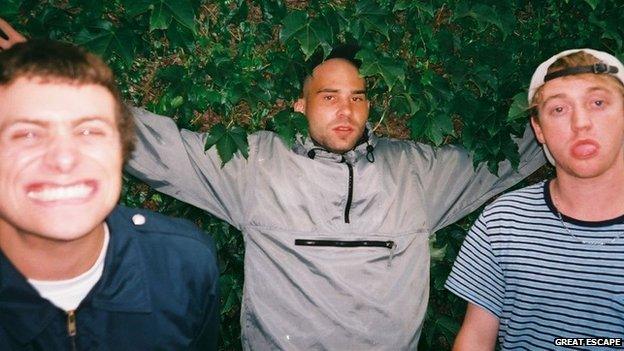
Australia's DMA's will also be playing at Latitude in July.
"Its not like that in Australia or American when it comes to rock 'n roll [where] you can slug it out and prove yourself over a couple of records. Here if you don't do it quick, you're screwed."
"We get a lot of pressure from our labels to make playlists and put up photos every day," says Mason, reflecting on the influence of social media. "It's weird. We're trying to buy into it, but we're getting pressured. People will judge a band on how many followers they have. It's pretty crazy".
South By Southwest organisers have been criticised for letting large numbers of commercial brands advertise and sponsor their event, regarded by some as damaging the independent sprit of music festivals.
And while big music headliners have long done sponsorship deals for tours, now new and undiscovered music is becoming more of a desirable commodity for commercial brands.
Video hosting service Vevo have taken over a venue at this year's festival to stage three days of new music gigs.
Executive Vice President International Nic Jones says more and more brands want to ally themselves to breaking groups.
"I think it's clear that more and more brands want to work with music, and music discovery. Previously they were maybe frightened by the idea of about working with an artist they didn't know. Now the underground has come to the surface."
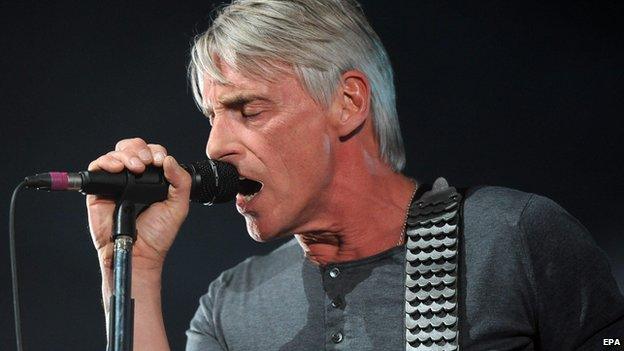
Singer Paul Weller played an intimate gig for selected Amazon competition winners at The Great Escape over the weekend.
Online music store Amazon also has a presence at The Great Escape. They host a new music stage, but also enlisted Paul Weller to play a surprise gig for competition winners.
"Our customers want to discover the next big thing, and we want to help them do that," says Paul Firth - Head of online music store Amazon Music.
"We want to help support music. If we were just selling the 'big hits' then we would not feel like we were putting anything back in," says Firth.
"We work really closely with The Great Escape. We've been in regular contact with their bookers and brand team to ensure that it remains the great small festival that it is, while still being able to grow and keep its core principles. "
Alabama Shakes - who played one of their first UK shows here three years ago - are one of a handful of established bands playing at the event.
Lead singer and guitarist Brittany Howard believes that brands associating themselves with music acts ultimately means they can afford to keep working in the face of music piracy.
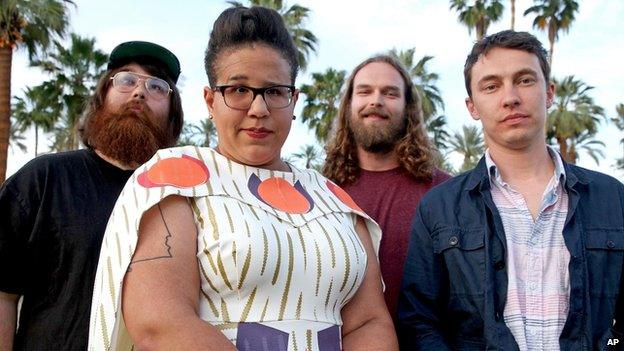
Alabama Shakes' Brittany Howard claims music piracy is driving the relationship between bands and brands.
"I'm not really savvy on the business side of being a musician," she claims. "I'm just on the 'being a musician' side.
"I mean, whose paying for these events? They cost a lot of money to put on. Things aren't the way that they used to be.
"I sometimes want to live in this dream world where you can just be a musician, and you could live that way and tour that way. Even if it's just by the skin of your knuckles, you could make it.
"Now bands try to do that and come back from a tour with a loss. They lose more than they gain from it.
"I don't think that's the way it should be, but now everybody steals music. So that's the root of all evils. People should pay for each others work."
Heritage performers
Alongside the new music and established bands, The Great Escape does attract some heritage performers.
This year reformed '60s 'baroque n' roll' band The Zombies are playing two shows.
For singer Colin Blunstone, it's a case of using every opportunity to get heard and connect with younger fans. "You do have to think of many different ways of getting your music to people," he says.
"Before it was 'radio airplay leads to chart position', and you toured and that was it. Now you have to be a lot more subtle about it. We've had songs in films and adverts. You just have to keep finding whole new way to reach a new audience."
Still the focus remains on new acts, so just who is making an impact among delegates this year?
It's impossible to focus on any one particular band with such an vast line-up, but judging by the reaction of the audiences, you'll soon be hearing a lot more from Brighton band Black Honey, Nottingham trio Kagoule. Arty Minneapolis alt rock outfit Hippo Campus and London four-piece The Big Moon.
For more on the Great Escape, listen to the BBC 6 Music Breakfast Show from 07:00 BST on Monday 18 May.
- Published27 January 2015
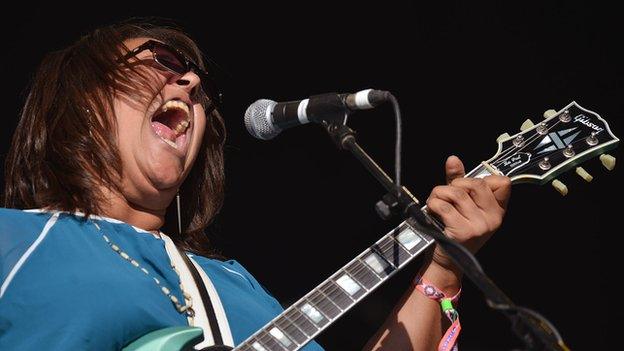
- Published14 May 2015
